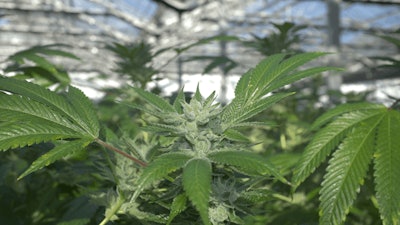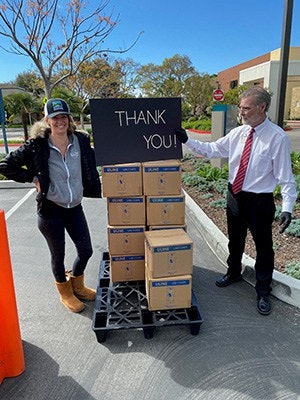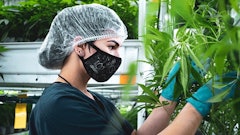
Like many other states, California has deemed the cannabis industry an “essential” business that can remain operational during the state’s stay at home order aimed at slowing the spread of COVID-19. For Graham Farrar, the founder and CEO of Glass House Farms, a vertically integrated cannabis operator based in Santa Barbara, Calif., this means cannabis businesses must step up to help those in need during this difficult and uncertain time.
“This is a time when we need everybody,” he told Cannabis Business Times. “If you’ve got a shovel, you need to get digging.”
The way Farrar sees it, the industry gets to be the light in an otherwise bleak time, and this is a great opportunity for cannabis businesses to shatter old stereotypes and stigmas while giving back.
“Sometimes you need help—and there have been a lot of people who have helped us along the way—and sometimes you get to be the helper,” he said. “We’re happy to return the favor to society and show how we can help out.”

Glass House Farms recently donated 1,000 lab gowns to Santa Barbara Cottage Hospital, which needed masks, gowns and other personal protective equipment. Glass House Farms operates 500,000 square feet of pesticide-free greenhouse space, so the company has a large inventory of gowns that are used as part of the company’s strict biosecurity protocols.
RELATED: 10 Questions With... Graham Farrar, CEO of Glass House Farms
"We use protective gear on our employees, so we don’t inadvertently spread pests throughout the greenhouse, and that approach is basically the same thing doctors do as they go from patient to patient,” Farrar said.
Glass House Farms’ philanthropic efforts don’t end there. The company’s dispensary, The Farmacy, is donating 5% of its sales to the local food bank, which is facing increased demand due to school closures, Farrar said. With schools closed due to the COVID-19 outbreak, the food bank is providing meals to children who would otherwise receive meals from their school.
The company is also part of a local cannabis farmers group, CARP Growers, which is soliciting a larger total goal of $200,000 to immediately support causes in its local community. CARP is also starting a local fund called the 93013 Fund (the zip code for the Carpinteria area where the farms are). CARP made an additional donation of $20,000 and is soliciting funds from the community to bring that up to $200,000 to support local causes.
The Glass House Farms team has also launched a Keep the Lights On program to help support the local restaurants in Santa Barbara that have been forced to reduce operations due to the pandemic.
“We’re a very tourist and hospitality town, and with every restaurant and bar closed, that’s probably 80% of our economy,” Farrar said.
To help keep the hospitality industry afloat, The Farmacy is buying its employees’ lunches from local restaurants through take-out orders. In addition, all the cannabis farms in the area, which Farrar said represent about 1,000 total employees, are ordering take-out lunches for their employees, as well.
“They’ve cut down to take-out only, so we’re going to try to step in and be their biggest take-out customers that they’ve ever had, ordering 1,000 meals a day to help them keep on keeping on throughout all of this,” Farrar said.
And while it works to help the broader community, Glass House Farms has not forgotten the safety of its customers and employees. The cultivation facility is currently operating in compliance with all CDC guidelines, including social distancing of at least 6 feet. Employees are working in shifts to limit the number of people working and taking lunch breaks at any given time, and anyone who is sick has been asked to stay home.
Handwashing and hand sanitizer stations are located throughout the cultivation facility, Farrar added, and at the end of each day, all surfaces are cleaned with a disinfectant.
Glass House Farms is also using a thermal camera to monitor the temperatures of employees in the cultivation facility.
“With the thermal camera, anyone over 99 degrees is being pulled out for a specific temperature check, so we’re keeping fevers and illness out of the scenario,” Farrar said.
At The Farmacy, budtenders started consulting with customers one-on-one to avoid large crowds in the dispensary, but the company has since implemented express pickup and delivery only.
“The process now is basically you place an order online, we’ll drop it off on your doorstep, or you can come to the store to pay and we’ll give you a ready-to-go package,” Farrar said.
Budtenders are also available in The Farmacy’s parking lot with tablets, so customers can walk up and place orders without even entering the dispensary.
“We’re making quite a few adjustments, but keeping things going,” Farrar said.
The company has seen an uptick in sales, he added, and many customers have expressed gratitude that the business is operational during this time.
“I think it keeps the staff going,” Farrar said. “It keeps the morale high when people say, ‘Thank you so much for being open. We’re so glad you’re here.’”
So far, Glass House Farms has maintained a stable supply chain, and the company plans to continue its efforts to protect its staff and customers while providing aid to the local community.
“We are working with the hospital to help them source things like masks,” Farrar said. “We’ve got some pretty good connections in China in terms of packaging, so we’re working with those suppliers to identify additional equipment for [the hospital]. Then, on our supply side, we stocked up pretty heavily, anticipating any potential disruption there. We diversified outside of China and other countries, as well, just trying to be as smart as we can to insulate ourselves for what’s to come.
“We’re one of the few businesses that have the horsepower to not just stay afloat but help out, and we want to do everything we can to put that to work and make the world proud and be contributing members of our community and help everyone else out."





















